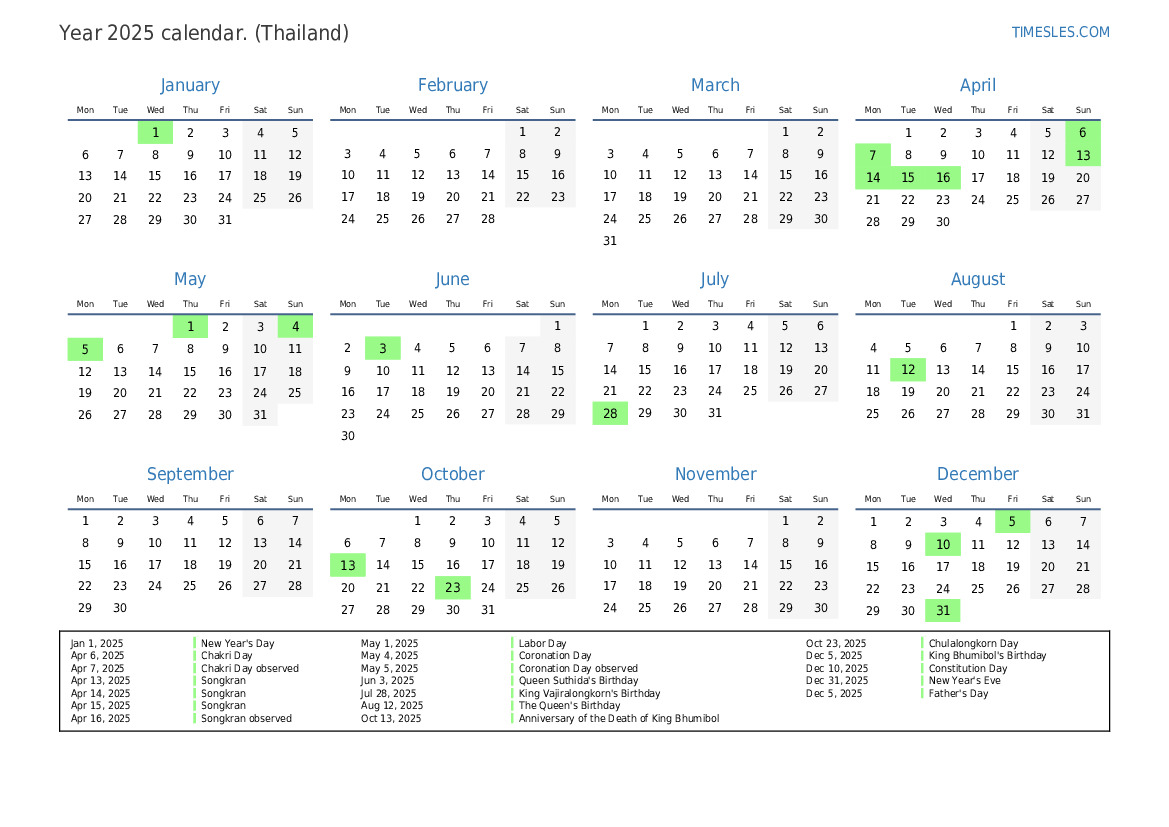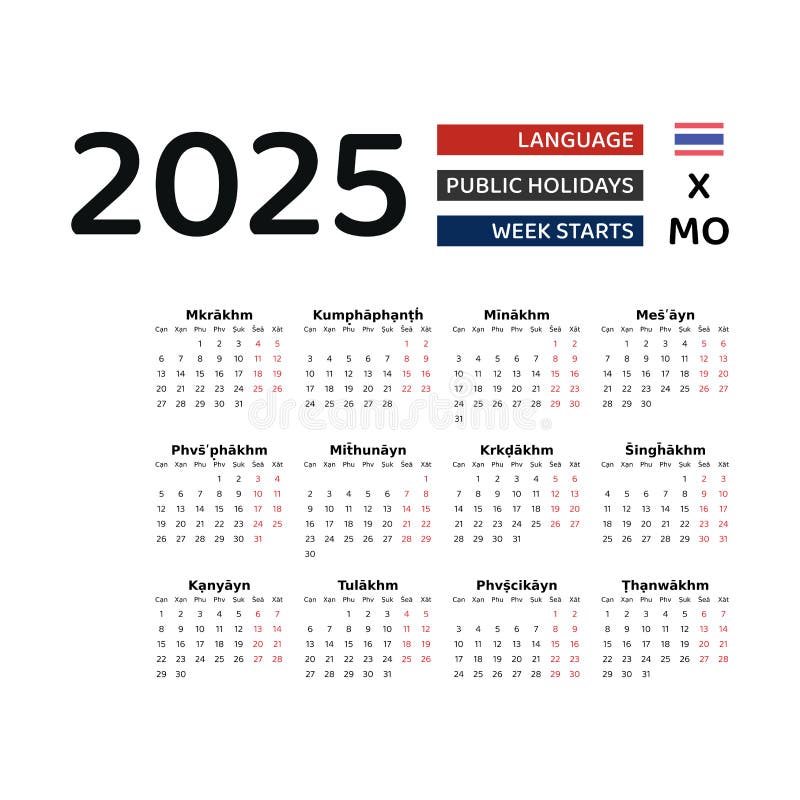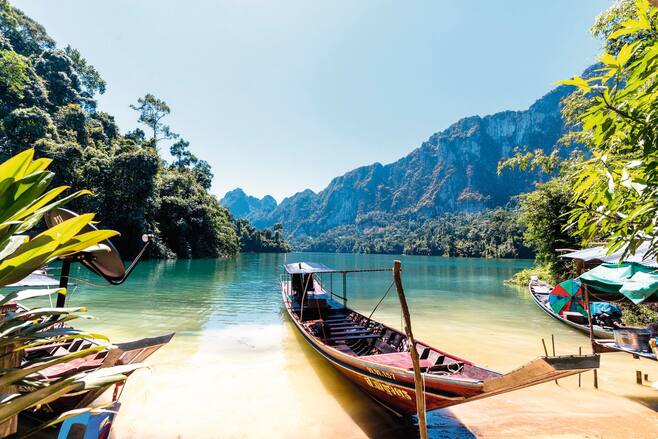A Comprehensive Guide To Thailand’s National Holidays In 2025
A Comprehensive Guide to Thailand’s National Holidays in 2025
Related Articles: A Comprehensive Guide to Thailand’s National Holidays in 2025
Introduction
With enthusiasm, let’s navigate through the intriguing topic related to A Comprehensive Guide to Thailand’s National Holidays in 2025. Let’s weave interesting information and offer fresh perspectives to the readers.
Table of Content
A Comprehensive Guide to Thailand’s National Holidays in 2025
Thailand, a land steeped in rich history and vibrant culture, celebrates its national holidays with fervor and solemnity. These holidays serve as important reminders of the nation’s heritage, its triumphs, and its values. Understanding these celebrations offers a glimpse into the heart of Thai society and its unique blend of tradition and modernity.
2025: A Calendar of Thai National Holidays
While the exact dates of some holidays may vary slightly due to lunar calculations, the following provides a comprehensive overview of the national holidays in Thailand in 2025:
January
- New Year’s Day (January 1st): This globally celebrated holiday marks the beginning of a new year and is observed as a day of reflection and new beginnings.
- Makha Bucha (Full Moon of the Third Lunar Month): This Buddhist holiday commemorates the gathering of 1,250 of the Buddha’s disciples. It is a day for reflection, meditation, and offering alms to monks.
- Chinese New Year (Date Varies): Celebrated by the large Chinese community in Thailand, this festival marks the beginning of a new year according to the lunisolar calendar. It is a time for family reunions, feasts, and colorful decorations.
February
- Valentine’s Day (February 14th): While not a national holiday, Valentine’s Day is widely celebrated in Thailand, particularly among young couples.
- Magha Puja (Full Moon of the Third Lunar Month): This Buddhist holiday commemorates the gathering of 1,250 of the Buddha’s disciples. It is a day for reflection, meditation, and offering alms to monks.
April
- Songkran (Thai New Year): This joyous festival, celebrated over a period of three days, marks the beginning of the Thai New Year. It is a time for water splashing, family reunions, and traditional rituals. Songkran is a significant holiday in Thailand, filled with vibrant festivities and cultural traditions.
- Chakri Memorial Day (April 6th): This day commemorates the establishment of the Chakri Dynasty, the ruling dynasty of Thailand. It is a day of remembrance and national pride.
May
- Coronation Day (May 5th): This holiday commemorates the coronation of King Rama X, the current monarch of Thailand. It is a day of national celebration and loyalty to the King.
- Visakha Bucha (Full Moon of the Sixth Lunar Month): This significant Buddhist holiday commemorates the Buddha’s birth, enlightenment, and death. It is a day for meditation, reflection, and paying respects at temples.
June
- King Bhumibol Adulyadej Day (June 5th): This day commemorates the birth of King Bhumibol Adulyadej, the late King of Thailand, who reigned for over 70 years. It is a day of remembrance and gratitude for his service to the nation.
July
- Asalha Puja (Full Moon of the Eighth Lunar Month): This Buddhist holiday commemorates the Buddha’s first sermon after his enlightenment. It is a day for reflection, meditation, and listening to the Dharma.
August
- Queen Sirikit’s Birthday (August 12th): This day commemorates the birthday of Queen Sirikit, the Queen Mother of Thailand. It is a day of celebration and respect for her contributions to the nation.
- Mother’s Day (August 12th): Thailand celebrates Mother’s Day on the same day as Queen Sirikit’s birthday. It is a day for showing appreciation and love to mothers.
September
- Father’s Day (September 5th): Thailand celebrates Father’s Day on the birthday of King Bhumibol Adulyadej. It is a day for showing appreciation and love to fathers.
October
- Chulalongkorn Day (October 23rd): This day commemorates the birthday of King Chulalongkorn, the fifth king of the Chakri Dynasty, who is known for his modernization efforts. It is a day of remembrance and national pride.
December
- Constitution Day (December 10th): This day commemorates the promulgation of the Thai Constitution in 1932. It is a day for reflecting on the principles of democracy and the rule of law.
- King’s Birthday (December 5th): This day commemorates the birthday of King Rama X, the current monarch of Thailand. It is a day of national celebration and loyalty to the King.
Beyond the Calendar: Understanding the Significance of Thai National Holidays
These holidays are not mere days off from work; they are deeply ingrained in Thai culture, shaping the national identity and reflecting the values of Thai society. Here are some key aspects to consider:
1. Buddhism’s Influence: The strong influence of Buddhism is evident in several holidays, such as Makha Bucha, Visakha Bucha, and Asalha Puja. These days are dedicated to spiritual reflection, meditation, and fostering a sense of community.
2. Royal Lineage and National Pride: Holidays like Chakri Memorial Day, Coronation Day, and King Bhumibol Adulyadej Day highlight the deep reverence Thais hold for their monarchy. These days are dedicated to remembering and honoring the contributions of the royal family to the nation.
3. Family and Community: Many holidays, like Songkran and Chinese New Year, are marked by family gatherings, feasts, and traditional rituals. These celebrations emphasize the importance of family bonds and community spirit.
4. Cultural Expression: Thailand’s national holidays offer a platform for showcasing the country’s rich cultural heritage. Traditional dances, music, and crafts are often featured in celebrations, providing a vibrant and engaging expression of Thai identity.
5. National Unity and Patriotism: These holidays serve as reminders of the shared history and values that unite the Thai people. They foster a sense of national unity and patriotism, reinforcing the spirit of "Thai-ness."
FAQs about Thailand’s National Holidays
Q1: Are all national holidays observed as public holidays in Thailand?
A1: Yes, all national holidays listed above are considered public holidays in Thailand, meaning most businesses and government offices are closed.
Q2: Are there any exceptions to the observance of national holidays?
A2: While most national holidays are observed as public holidays, some businesses, particularly in the tourism sector, may remain open. It is always advisable to check with individual businesses or organizations to confirm their operating hours during holidays.
Q3: What is the significance of the water splashing tradition during Songkran?
A3: The water splashing tradition during Songkran symbolizes cleansing and washing away bad luck from the previous year. It is a joyful and playful way to usher in the new year with a fresh start.
Q4: Are there any specific customs or traditions associated with each national holiday?
A4: Each holiday has its own unique customs and traditions. For example, during Visakha Bucha, people often wear white clothing and participate in candlelight processions. During Songkran, families traditionally visit temples to pour water on Buddha statues and seek blessings for the new year.
Q5: How do Thais typically celebrate national holidays?
A5: Thai people celebrate national holidays with a mix of solemnity and festivity. They often visit temples, participate in traditional rituals, and gather with family and friends for meals and celebrations. Public events and parades are also common, especially during major holidays like Songkran and King’s Birthday.
Tips for Travelers Visiting Thailand During National Holidays
- Book accommodations and flights in advance: National holidays are peak travel seasons, so booking accommodations and flights well in advance is essential.
- Be aware of potential crowds: Expect larger crowds and longer wait times at popular attractions and transportation hubs during holidays.
- Respect local customs and traditions: Show respect for local customs and traditions by dressing appropriately and being mindful of religious observances.
- Embrace the festivities: Take the opportunity to experience the unique cultural expressions and celebrations associated with each holiday.
- Learn a few basic Thai phrases: Even a few basic Thai phrases can go a long way in making your travel experience more enjoyable and enriching.
Conclusion: A Tapestry of Tradition and Modernity
Thailand’s national holidays offer a window into the nation’s rich history, cultural tapestry, and enduring values. These celebrations, filled with both solemnity and festivity, are a testament to the resilience and vibrancy of Thai society. Whether you are a visitor seeking a deeper understanding of Thai culture or a resident looking to connect with your heritage, these holidays provide a unique and enriching experience. By understanding the significance and traditions associated with each holiday, you can truly appreciate the unique spirit of Thailand and its people.






;img.crop(width:658%2Cheight:370))
Closure
Thus, we hope this article has provided valuable insights into A Comprehensive Guide to Thailand’s National Holidays in 2025. We hope you find this article informative and beneficial. See you in our next article!
You may also like
Recent Posts
- Exploring The World In February 2025: A Guide To Travel Destinations
- Navigating The Summer School Holidays In The UK: A Comprehensive Guide For 2025
- Navigating Singapore’s Public Holidays In 2025: A Comprehensive Guide
- A Comprehensive Guide To Skiing Holidays In January 2025
- Embracing The Winter Wonderland: A Comprehensive Guide To Ski Holidays In January 2025
- Tenerife In April 2025: A Springtime Escape To The Canary Islands
- The Future Of Travel: A Look At Holiday Trends For 2025
- Unveiling The World Of Travel: An Exploration Of Thomas Cook’s 2025 Brochure
Leave a Reply